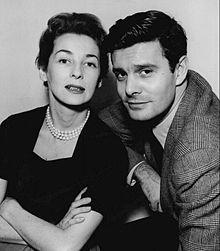
Felicia Cohn Montealegre (3 March 1922 – 16 June 1978) was a Chilean stage and television actress born in San Jose, Costa Rica. From 1951 until her death, she was married to the American composer and conductor Leonard Bernstein.
Life and career
Montealegre was born on March 3, 1922 in San José, Costa Rica to Clemencia Montealegre Carazo and Roy Elwood Cohn. Educated in Chile she was raised Catholic, and later converted to Judaism, when marrying Leonard Bernstein (her own paternal grandfather had been Jewish).[1] She established herself in New York, where she took piano lessons from her Chilean compatriot Claudio Arrau.
Montealegre's voice can be heard on two works conducted by Bernstein: his own Kaddish Symphony as well as a version of Debussy's Le martyre de Saint Sébastien, partially performed in English.
Montealegre also appeared in several television dramas, including a 1950 dramatization of Henrik Ibsen's A Doll's House on Kraft Television Theatre, in which she played Nora. Another appearance on television includes the 1949 CBS teleplay (part of the "Studio One" series) based on Somerset Maugham's novel Of Human Bondage, in which Montealegre played Mildred opposite Charlton Heston as Philip Carey.[2] She made no feature films, but starred in the 1976 Broadway play Poor Murderer.
In popular culture
Montealegre features prominently in Tom Wolfe's essay "Radical Chic & Mau-Mauing the Flak Catchers."
Personal life
Montealegre met composer-conductor Leonard Bernstein in 1946 at a party given by Arrau. Their first engagement was broken off, and she subsequently had a several-year relationship with Broadway and Hollywood actor Richard Hart.[3][4] After Hart's death she married Bernstein, in 1951, with whom she had three children, Jamie, Alexander and Nina.
Montealegre helped found an anti-war organization educating women against the war in Vietnam "Another Mother for Peace" in 1967, and became controversial when she and Bernstein hosted an evening for the Black Panther Party in 1970. She was a primary focus in Tom Wolfe's New York essay recounting the events of that night entitled "Radical Chic: That Party at Lenny's".[5] Two years later, she was also one of the hundred arrested in an antiwar protest in Washington, D.C. [6]
Death
Montealegre died of lung cancer in East Hampton, New York, in 1978, aged 56.
References
- ^ Secrest, Meryle (1995). Leonard Bernstein: a life - Meryle Secrest - Google Books. ISBN 9780679737575. Retrieved May 2, 2012.
- ^ https://archive.org/details/StudioOneOfHumanBondage1949
- ^ "Richard Hart: Yearning for the Stage". Films of the Golden Age (77): 66. Summer 2014.
- ^ "Richard Hart". neptune.spaceports.com.
- ^ https://nymag.com/news/features/46170/
- ^ https://www.nytimes.com/1978/06/17/archives/felicia-montealegre-c-bernstein-actress-composers-wife-dead.html
External links
- Felicia Montealegre at IMDb
- Felicia Montealegre at the Internet Broadway Database